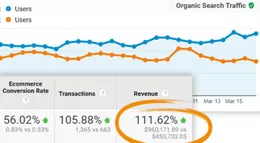Six SEO Things Google Loves
Maybe you can’t woo the world’s largest search engine with traditional gifts like candy and flowers. But you can significantly improve your Google rankings if you know the six SEO things Google absolutely loves.
In this article, we’re going to explore the world of Google search results and what you can do to improve your chances to attract search engines with your page content.
If you want to create compelling content that will improve your Google ranking, this article will provide 6 can’t-miss search engine optimization tips.

6 Ways to Make Search Engines Love Your Site
1. Keep Your Site Updated With Fresh Content
2. Provide Relevant Content on Your Web Pages
3. Create a Clear URL Structure Based on Page Title and Target Keyword
4. Ensure Your Page Loads Quickly
5. Include Quality and Relevant Links
6. Build Authority Over Time
1. Keep Your Site Updated With Fresh Content
Stale content isn’t just tedious for your loyal customers; it’s a downer for our favorite search engine, and your Google rankings will reflect that.
Don’t let your website stagnate.
If your content hasn’t been updated since the first time Tobey Maguire donned the Spider-Man costume, Google search results will give you the brush-off. On the other hand, Google loves to crawl new content and add it to its database, so it’s critical to keep content fresh by conducting regular content audits and updates to your own site.
Fresh Ideas Are Key to Search Engine Optimization
What’s a website to do to keep things fresh and attractive for search engines? Here are a few possibilities to ensure your site’s content is crawl-worthy for Google search:
- Add New Products
- Update Product Descriptions
- Reinvigorate and Promote a Popular Brand
- Create New Landing Pages
- Optimize Existing Category Content
- Write a New Blog Post
These types of additions and enhancements provide valuable fodder to improve Google rankings and give potential customers more reasons to visit your website often. Follow these strategies to really take advantage of google search results.
2. Provide Relevant Content on Your Web Pages
Relevant content builds solid SEO value. Google adores when your website is everything you say it is. Conversely, Google will drop you like a hot potato if you misrepresent yourself. Think of it like online dating – once your audience finds out the profile picture you posted is 20 years old, you’re not going to get a lot of takers. No one likes to be disappointed when they come to your website under false pretenses, and Google is no exception.
Building Relevant Content
Everything you do on your website should be focused on the goods and services featured on your website. There are a few things you can do to own your content and do Google proud:
- Optimize your pages with relevant keywords.
- Audit page titles to ensure you’re getting the best value.
- Create keyword-rich articles that accurately support your products and services.
The addition of keywords related to the focus of your website will indicate to Google what your site is about. It will also bring in new visits for different but related search terms from visitors that have a vested interest in what you’re offering.
3. Create a Clear URL Structure Based on Page Title and Target Keyword
A uniform/universal resource locator (URL) is the unique name of your web page address. (It’s located in your web browser’s address bar.) Having a precise URL is a key signal to Google of what your website is all about. The first part of the URL is your domain name. The part of the URL that identifies your page is called a “path.”
How to Choose a Google-Friendly URL
When crawling a page, Google loves to find words in the URL related to the content found there. For example, a web page with the URL bean-bag-chairs.html will receive a much better position in the search engine rankings for the search term “bean bag chairs” compared to a web page with the URL page1.html. That’s because the former tells search engines what to expect to find on the page. When the URL matches the keyword phrase or phrases on that page, it knows it has found quality content. Here is a quick guide for creating the most effective URL path for your page:
- Keep it Brief: Shorter URL paths tend to rank higher in search results.
- Use Meaningful Keywords: Using specific, targeted keywords will improve your Google rankings for those terms.
- Put Hyphens Between Words
- Don’t Include Stop Words: These are words like the, and, or, of, a, etc. “Stop Words” are fine in the body of your content to help link target keywords together to help them sound more natural, but they aren’t helpful or necessary in URLs.
- Use All Lower Case Letters
- Redirect Old URLs. Nothing will drop your Google rankings faster than broken links. Fix them to help search engines direct customers to your pages.
4. Ensure Your Page Loads Quickly
Google loves to scan websites quickly. As it decides which web pages to show in a search result, it considers hundreds of different elements. Several components go into this mathematical algorithm. The time it takes for a page to load is a key factor in determining your site’s Google rankings. If your page loads quickly, search engines get a warm and fuzzy feeling inside. If it takes forever, your site will get the cold shoulder in the form of lower-ranked search results.
Accelerating Website Load Times
You can test your web page’s speed here by entering its URL. If you’ve got a pokey page, there are several things you can do to improve its upload speed. Following are a few suggestions:
- Reduce the Size of Your Images
- Combine & Minify Files
- Reduce HTTP Requests
- Reduce Server Response Time
- Ensure You’re Using the Best Hosting Option
- Enable File Compression
- Set up Browser Caching
- Clean up Your Media Library
5. Include Quality Links
Links are one of the most important trust signals that Google uses to evaluate a domain’s authority and determine website rankings. Google adores quality links. If you want your website to signal that it is a worthy resource, obtain a link from a highly trusted and established website. Naturally, you want to avoid linking to a competitor’s website or a site that holds extreme views that could alienate potential visitors to your website.
What Is a Quality Link?
Linking to the New York Times’ website will enamor Google much more than one from a newly created blog with minimal history. Trust is essential in any relationship, and having high-quality links that point to your website will reinforce this trust and solidify your standing on the web.
Internal Links Are Good, Too
If you’re hosting an article that’s pertinent to content on your website, by all means, link them up. It’s another way to strengthen your credibility with Google. Just make sure you continue to build an inventory of articles to use – there’s not much value to linking to the same piece over and over.
6. Build Authority Over Time
When it comes to the age of your website, Google knows older is better. Experience carries a lot of weight. If the age of your website’s domain is older than your competitors’, your site will probably appear higher in search engine results. On the other hand, if your domain name was purchased last week and your site is brand new, it will take a little more time to get great rankings
How Long Does it Take Google to Index New Content?
This is one of the most-asked questions but has one of the hardest-to-pinpoint answers. There are so many algorithms involved you’ll get an answer that ranges anywhere from several hours to several weeks for Google to index new content. Just how long it takes is determined by how good a job you did wooing Google with relevant content, successful keywords and efficient coding.
KodingWeb Can Boost Your Content With SEO That Google Loves
We’ve helped clients from all businesses and industries find their Google mojo. Our team of Google SEO experts will develop a plan to move your website up the ranks to a solid spot in the upper regions of the search engine results page. We provide full-service solutions that encompass optimization of existing pages and new, SEO-infused content that maintains your brand voice. Call us today, and let’s talk about how we can bring Google love to your website.


